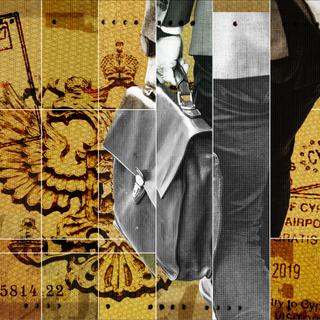


How dirty money and Russian riches flow through Cyprus, a gateway to the EU
InvestigationTax advantages. Golden visas. Judicial leniency. The Cyprus Confidential investigation by Le Monde and its partners, based on leaks, sheds light on how the island's economic model was allowed abuses, despite warnings from anti-fraud watchdogs.
Cyprus has a long-standing reputation as a tax haven and haven for Russian oligarchs, who have long indulged criminal money. But a new investigation by the International Consortium of Investigative Journalists (ICIJ), published simultaneously by 69 news organizations, including Le Monde, sheds a harsh light on the consequences of the Cypriot economic model.
Based on the leak of 3.6 million confidential documents from six Cypriot financial services firms – ConnectedSky, Cypcodirect Corporate Services, DJC Accountants, Kallias & Associates, MeritKapital and MeritServus – the Cyprus Confidential investigation confirms that the island in the Mediterranean Sea serves as a gateway for dubious financial transactions in the European Union (EU).
Year after year, anti-money laundering authorities have issued warnings, worried about repeated financial scandals. However, due to a lack of political will, the EU has allowed this kind of business to flourish within its borders. Cyprus is a place where shell companies can be registered on a large scale, and Russian money flows abundantly. Russian oligarchs come to the island to take advantage of minimal taxation and long-standing banking secrecy. Among the clients of the six Cypriot firms revealed by this investigation, ICIJ and its partners have identified 96 Russian people who have been sanctioned by the West since 2014 and are linked to at least 800 separate companies or trusts.
An opaque financial center, a haven for Russian money, a grey zone for the cyber economy: The Cyprus Confidential investigation tells the story of how Cyprus, a small Mediterranean island, has allowed itself to be overwhelmed by its offshore industry, and has become the European Union's weak link in the fight against dubious financial flows.
The investigation is based on the leak of 3.6 million confidential documents from six Cypriot financial services firms (ConnectedSky, Cypcodirect Corporate Services, DJC Accountants, Kallias & Associates, MeritKapital and MeritServus) and the i-Cyprus company register. The leaks were obtained by the International Consortium of Investigative Journalists, the Organized Crime and Corruption Reporting Project and the German investigative outlet Paper Trail Media, with the support of Distributed Denial of Secrets, a group of activists campaigning for transparency. The leaks were then shared with 69 international news organisations, including Le Monde.
This investigation notably reveals central role of the MeritServus cabinet in managing the offshore empire of Roman Abramovich, a powerful businessman close to Vladimir Putin and the former owner of English football club Chelsea. He holds 14 trusts in Cyprus and around a hundred companies in tax havens.
'Urgent' transactions before sanctions
It also shows that the Cypriot branch of the auditing giant PwC helped Alexei Mordachov, one of Russia's wealthiest oligarchs, transfer over $1.4 billion in assets to his wife in March 2022, the day after he was placed under sanctions. The transaction was eventually blocked and the funds remain frozen.
On the same day, the multinational company helped two other Russian billionaires, Alexander Abramov and Alexandr Frolov, to carry out an "urgent" $100-million transaction between shell companies, shortly before their assets were frozen. PwC has declined to comment on these transactions, but insists that it complied with all applicable regulations.
These examples illustrate the excesses of the economic model put in place by the former British colony, based on a hypertrophied financial sector that is largely dependent on Russia. After decades of prosperity, this model has finally ensnared the country – and risks dragging down the whole of the EU.
You have 75% of this article left to read. The rest is for subscribers only.
